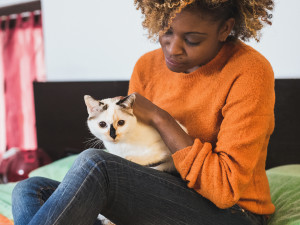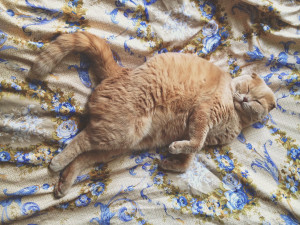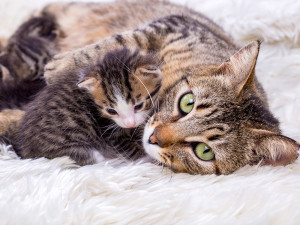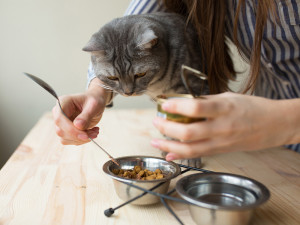What Is a Cat’s Primordial Pouch? Learn About This Feature on Cats
Before you put your cat on a diet—read this.

Share Article
In This Article:
What Is a Cat’s Primordial Pouch? Why Do Cats Have a Primordial Pouch? Why Is a Primordial Pouch So Big? Does a Primordial Pouch Mean My Cat is Overweight? When to Call a Vet Why Is the Internet Obsessed With Primordial Pouches?
Cats are quite fascinating to look at, especially because they have many features that are so different from other animals. One particularly curious characteristic is the hanging pouch on the underside of their bellies. This loose, sagging skin is often mistaken for just fat, and the cat is believed to be overweight. That may be the case, but this isn’t always true.
Every cat has this pouch, even the most svelte ones. It’s called the primordial pouch, and in this article, we’ll explore what it is, why cats have them, and how to distinguish a cat with a primordial pouch from a fat cat.
What is a cat’s primordial pouch?
A cat’s primordial pouch is the loose flap of skin and fat hanging along the lower abdomen. Every cat has one. You can see it best when a cat walks or runs, and it sways from side to side. It is a normal part of the feline anatomy, and a cat doesn’t have to be overweight to have one. Certain breeds, such as the Bengal, Egyptian Mau, and Japanese Bobtail, have more prominent primordial pouches.

Why do cats have a primordial pouch?
No one knows for sure why this pouch is found on cats, but there are hypotheses about why this extra skin and fat hang from your cat’s abdomen.
What causes a cat-hanging belly?
Here are some theories as to why it exists.
Protection: Some experts have suggested that the pouch provides extra skin that acts as a cushion during fights. You’ve probably seen this: When two cats fight with each other, they may kick with their hind legs. In such circumstances, the pouch may help protect important organs from injury.
Flexibility: Another theory is that the extra skin allows a cat to jump, sprint, or stretch more easily. This improved movement and flexibility is also seen in wild cats, such as cheetahs, and it aids in their ability to run at high speeds.
Storing food: In the wild, cats don’t eat regular meals — instead, they gorge when food is available. The pouch may allow for stomach expansion after large meals. Modern-day cats don’t need this feature, but it often takes many generations for a characteristic that’s no longer needed to disappear.
Why is a cat’s primordial pouch so big?
Some cats have larger primordial pouches than others. Factors that affect the size include age, weight loss, and genetics. Older cats tend to have larger pouches. If a cat loses weight, the pouch may appear more prominent. Genetics naturally leads some cats to have larger pouches.
Feline primordial pouch vs. body fat
How can you tell the difference? It’s not always easy, but here are some tips.
When a cat is overweight, the extra fat is distributed over the whole body. A primordial pouch is located just under the lower abdomen.
A pouch is flexible and soft, while fat is firmer.
If you notice that your cat’s belly jiggles while it runs, but the rest of the body is lean, it’s most likely the primordial pouch.
If you have any difficulty telling the difference, see your vet.
Does a primordial pouch mean my cat is overweight?
No, all cats have primordial pouches, so this does not mean all cats are overweight. If other parts of your cat’s body have excess fat, such as the neck, back, and ribs, they may be overweight.
Here’s how to keep your cat at a healthy weight.
Feed them a balanced diet with the proper portion sizes.
Encourage your cat to exercise. Have active playtime, and provide plenty of toys.
Schedule routine vet check-ups to monitor your cat’s health.
A veterinarian can help assess your cat’s body condition to determine if weight loss is necessary.
When to call a veterinarian about your cat’s primordial pouch
A primordial pouch is almost always normal, but there are a few instances where you may want to confirm that with your veterinarian:
If the pouch suddenly changes in size
If your cat seems to be in pain or has trouble moving
If the area shows signs of infection (redness, heat, swelling)
If there are lumps or abnormal growths
If you’re unsure whether your cat’s belly is normal or a cause for concern, consult your veterinarian for peace of mind.
Why is the internet obsessed with the primordial pouch?
The internet is obsessed with all things cats. One of the biggest reasons is probably because cats are so beautiful, stately, and sleek. Therefore, when they do something quirky, it’s unexpected and funny. One of the most amusing things you can observe is an adorable cat running with their pouches swinging side to side. There are nicknames for the primordial pouches: “jelly belly,” “cat flap,” and “pouch of adorableness.”
Bottom line
Every cat has a primordial pouch.
It’s a natural feature that can provide protection, flexibility, and storage.
It’s sometimes difficult to distinguish it from extra weight. Check with your vet to see if your cat needs weight loss.
Don’t worry about it unless the pouch changes size, appears infected, develops lumps, or seems to be causing your cat pain. Just enjoy all the little quirks that make your cat so cute.
References
Beltran, Isabella. “Cat’s Primordial Belly Pouches-- What Is It For?” Science Times, 11 Apr. 2021, www.sciencetimes.com/articles/30596/20210410/cats-primordial-belly-pouches-what.htmopens in new tab.
“The Primordial Pouch.” Outdoornebraska.gov, The Primordial Pouch, 2 Aug. 2024, digital.outdoornebraska.gov/nebraskaland-magazine/the-primordial-pouchopens in new tab.
Santora, Tyler. “Why Do Cats Have Belly “Pouches”?” Livescience.com, 10 Apr. 2021, www.livescience.com/cats-primordial-pouch.htmlopens in new tab.
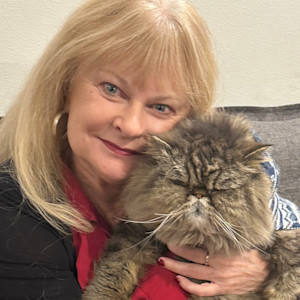
Dr. Shelby Neely, DVM
Dr. Shelby Neely is a freelance writer and veterinarian who graduated from the University of Pennsylvania School of Veterinary Medicine and has practiced veterinary medicine for 30 years, specializing in small animals. Her work has appeared in Allivet, AsktheCatDoctor, WhiskerDocs, Ask the Cat Doctor Radio, Ask the Cat Doctor TV, and numerous other websites, brochures, newsletters, newspapers, and ebooks. In her spare time, Dr. Neely likes to spend time with her three children, two grandchildren, three cats, two grand-cats, and five grand-dogs.
Related articles
![overweight orange cat]()
How Much Should You Actually Be Feeding Your Cat?
If they’ve lost their hourglass figure, then not that much — according to a veterinary nutritionist.
![Mom cat and her kittens.]()
Is My Cat Pregnant?
These are the signs of pregnancy in cats.
Why Is Your Cat Always Hungry?
Even if you don’t think they should be.
![Woman feeds gray cat dry food.]()
Does Your Cat Need a High-Protein Diet Like Some Bro at the Gym?
While they might not be working on their “gains,” there are other reasons this diet could be a good fit.
Why Does My Cat Throw Up After Eating?
That doesn’t seem normal...

